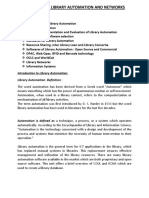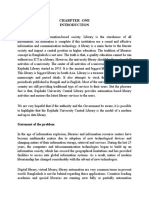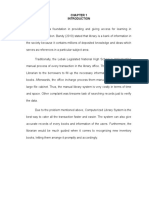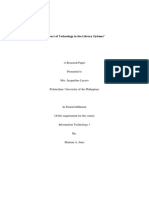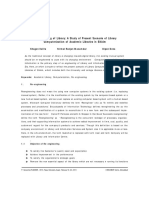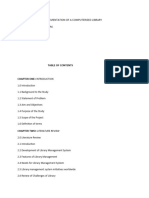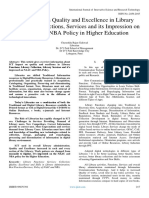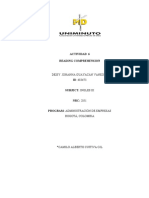PRINCE ABUBAKAR AUDU UNIVERSITY ANYIGBA
P.M.B 1008, ANYIGBA, KOGI STATE
NAME: ITOLO SUNDAY AJE
MATRIC NO: 23LS1038
COURSE CODE: LIS 315
COURSE TITLE: LIBRARY AUTOMATION
DEPARTMENT: LIBRARY & INFORMATION SCIENCE
FACULTY: EDUCATION
LEVEL: 300 L
QUESTION:
As a 300level student of Library and Information Science, Faculty of Education,
Prince Audu Abubaka University Anyigba, itemize and explain serially five (5)
major rationale for library computerization in West Africa
LECTURER: DR. AZAKI Y. JIBRIN
1
�Introduction
The concept library computerization process originated quite some decades ago in the more
technologically advanced countries of the world such as the United States of America, Canada,
Great Britain (AKINTUNDE, 2002). It is observed thus that the trend has gradually transcended
to other states of the world especially the impetus is more in the growing third world countries
such as in the African, Asian and the Caribbean countries.
Library computerization is the process of adequately utilizing computer hardware cum software's
and its varying facilities such as networking cables, software packages, scanners aid pointes in
accomplishing library functions which were originally performed manually by the librarians.
Obaseki (2007) stated that “[…] computers have transcended, the status of mere computing to
communication as the uses of computers worldwide are primarily for communication data in
networked environments”.
Computerizing the library functions and services encompasses the initial:
planning processes;
Selection of hardware and software;
Acquisition of selected hardware and software;
Training of library personnel on the use;
Maintenance of these novel system;
Networking of computer terminals (inter linking of computers);
Retrospective conversion of the library collections i.e. printed materials and artifacts
records by means of computer software into machine readable options.
2
�Benefits of Library Computerization
The computer application and use the libraries all over in Nigeria have proved to be
magnanimous contribution to the over-all educational enhancement of all humans irrespective of
social, economic, religious cum racial affiliations. This is a truism as library computerization
has led to the:
a) Increase in the patronage and use of information resources at various information centers
especially the library, vis-à-vis the growth in personnel information quotient of persons
in the world. This is so as the provision and application of computers and its other
peripherals in the library have transformed the library into digital studios were
information easily could be manipulated and acquired. In addition this novel trend of
library computerization attracts patrons to the library for various purposes, some for
sightseeing, recreation, research etc. It is observed that the rate of library patronage
especially in universities universally has increased drastically, as in case with Nigeria,
were people hardly use the library in early 1990s. The situation has changed as librarians
and library management now employ means to curtail the overpopulation of their
libraries especially in university (academic) libraries e.g. Bayero University library were
clienteles want to use, touch or have the feeling of being around a computerized digital
library.
b) Increase in moral and prestige of library staffs/personnel's. In most Africa states per se
the concept of who a librarian is, to the lay man outside, was subjectively dehumanizing
to the library personnel: Hence they were viewed only as Book-keepers/Book sellers of
little importance to the society. This reason however was owned to the decline in our
level of education cum the inability of the past African states government especially the
3
� colonial authorities to shed light on the importance of libraries to educational
advancement of all society as obtainable in Europe and the Americas. Recent
development in the universe has precipitated the novel concept of information age,
which entails that all human has to live, eat and sleep with information. It was observed
that to easily get this information in the era the library has to be technologically
improved, hence the gradual change from manual to computerized ways of performing
all libraries functions and services. Thus the presence of these equipments in libraries
attracted persons to the librarians who the patrons now see as technologist or experts in
manipulating these equipments and at same time above the library staffs. On it own the
egoistic attributes on the librarian have swelled as they now view themselves as
information scientists/managers rather than book keepers.
c) Faster and easier ways of getting library functions, services and activities done. Book
selection and acquisition; bibliographic searching and reference services; interlibrary
loans and cooperation are some of the tasks of libraries that were before now done
manually i.e. with human efforts and much time. These recent trends of library
computerizations have made these task a mere children game. This is so as the eventual
"[…] application of computer to library has made the library work easier and faster to
accomplish” (KUMAR, 1995). Also library computerization when properly applied has
the tendency of breeching internationally acclaimed physical boundaries. This is truism
as with the use of the international network system libraries computerized can participate
in resource sharing activities amongst themselves; this will lessen the amount of funds
spent in acquiring physical information resources.
4
�d) Creation of job opportunities within the library. This is necessitated by the presence of
computers and its accessories. Observed that the library has transcended to the height of
an organization, in less than a decade, from the focal point of just building where books
are kept. At present there are novel men job categories in libraries, especially the
academic libraries such as web developers, computer instructors, maintenance officers,
ICTs managers/officers, just to mention a few.
e) Computerization of libraries has provided libraries with cheaper means of purchasing
information resources for their libraries. This is so as other methods were the libraries
have to apply the use of manual means in selecting and acquiring its resources is more
costly and involves more human efforts. Thus libraries now acquire information
resources through the World Wide Web and Internet, this have made it more affordable
for libraries to procure more current information resources such as journals, which are
very costly when procured in physical format.
Though these noticeable novel trends that are resultant effects of library computerization have
gone a long way in shaping and stabilizing the educational aims and objectives of all
international state especially in African states such as Nigeria. There exist still some
impediments towards proper library computerization. They include:
1. Financial impecuniosities
Often it has been noted that library management and librarians are willing and ready to make
changes from the traditional method of library to novel trends, there is the negating factor of
scarcity of funds. This factor over time has been viewed as a resultant posture of library
management lukewarm approach to library development. Hence management exhibits their tight
fist nature towards funds release for the procurement of novel library technologies and tools.
5
� 2. Dearth of Qualified Competent Librarians
Libraries especially in developing countries are be quitted with arrays of personnel’s who are
not librarians by qualification. Hence these persons who function as library personnel’s do not
have the capacity of functioning properly in a library environment thus leading to the under
development of the library in function and services rendered.
3. Lackadaisical attitude of librarians towards rendering of service
The future of libraries lies in the ability of librarians to collaborate with faculty. To do so, the
librarian needs to be considered as an equal with faculty members.
Today’s librarian should develop awareness of the culture of her library and the culture in which
the library exists, they should live and participate in the intellectual discourse so vital to the
university community and the librarian should be constantly involved in scholarly research. In
doing this, will eradicate the notion of many persons towards who a librarian is.
Other impediments include:
Inadequate library legislation;
Submissive attitudes of library heads;
Autocratic/dictatorial stance of library parent management.
Furthermore, Amekuedee (1995) stated that barriers to successful library computerization in
Ghana include:
6
� Lack of co operation among university libraries;
Attitudinal problems among librarians; and
Personnel problems.
Once these above hindrances are tacked librarians and libraries, all over the globe will definitely
take a deep breath of satisfaction as result of the habitable atmosphere created by library
computerization.









